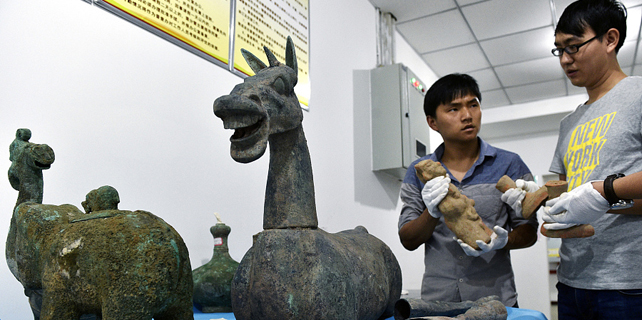SUV popularity becomes entrenched in Chinese auto market
China is encouraging consumers to buy electric vehicles (EVs) to help curb air pollution, but buyers in the world's largest auto market prefer SUVs and the global and domestic auto industries are capitalizing on that segment's growth.
In 2016, automakers in China sold nearly 9.2 million sport utility vehicles or SUVs, up 45.7 percent from 2015, according to the China Passenger Car Association. The Chinese market accounted for sales of about 28 million units last year the China Association of Automobile Manufacturers reported. And in the first four months of this year, SUVs captured 40 percent of the market and sedans shrank to 48 percent, according to the association.
Market research company Euromonitor International said that globally sales of SUVs increased from 5 million units in 2000 to more than 20 million in 2015 and are forecast to hit 42 million by 2031.
Robin Zhu, an auto analyst at Sanford C. Bernstein & Co, expects SUVs to start outselling sedans in China next year and noted that China now has the highest sales penetration of SUVs globally, recently surpassing the US.
"The growth to date has mostly been in the smaller SUV segments, although that's begun to change in the last 12-18 months," he said in an email. "The fastest growing SUV segment is now at the top of the market. On our count, SUVs over $37,000 (250,000 yuan) have increased more than 70 percent so far in 2017."
A spokesman for Ford Asia Pacific, a unit of the Ford Motor Co, said annual sales of Ford's SUV models EcoSport, Kuga, Edge, Everest and Explorer in the mainland surpassed 300,000 vehicles, up 9 percent compared to 2015.
"Ford's SUV sales performance mirrors the growth and popularity of SUVs in the China market, particularly with our performance in the small and large SUV segments, which are some of the most popular segments industry-wide," spokeswoman Mary Katherine Lim wrote in an email.
Chinese automakers also are joining the SUV push, realizing that many young Chinese families want bigger vehicles because they are likely to have a second child. At the North American International Auto Show in Detroit last January, Chinese carmaker Guangzhou Automobile Group (GAC) unveiled the Trumpchi GS7, a midsized SUV to capitalize on rising sales in China.
"China is moving in that direction as over 90 percent of our sales in China in 2016 were SUVs," said Zhang Fan, vice-president and head of the team that developed the GS7.
Even foreign automakers who want to enter the Chinese market are aware of the popularity of SUVs. Czech carmaker Skoda Auto launched the Kodiaq in April. "An automaker will not make it in China without a proper SUV plan," said Skoda CEO Bernhard Maier.
The Wall Street Journal recently reported that official targets call for 40 percent of the vehicles sold in China by 2030 to be electric vehicles.
Zhu believes that the change to electric or even hybrid offerings will be slow. "Hybrid/electric SUVs – slowly yes. (But) EVs are still far too expensive outside cities with license plate restrictions (where these restrictions swing the argument) so there's not much demand from consumers," he said.
Ford has outlined a production strategy to match the EV goal. "In April we announced within five years an all-new fully electric small SUV will be available in China. By 2025, Ford will provide a comprehensive range of electrified vehicles in China – hybrids, plug-in hybrids and fully battery-powered electric vehicles. By then, 70 percent of all Ford nameplates will have electrified powertrain options," the company said.
paulwelitzkin@chinadailyusa.com









